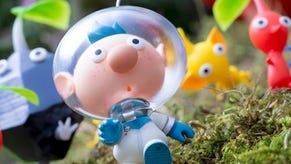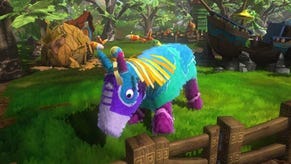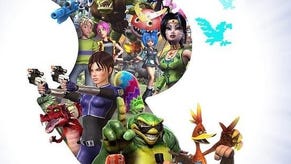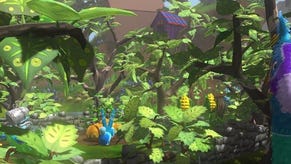A Rare pleasure
Eurogamer tours Rare, and delves into Viva Pinata's development.
Xbox Vision
Microsoft's introduction also helped bring about another angle - the matching TV show, produced by 4Kids Entertainment in the US. 26 episodes have been made (each a two-parter), and production director Simon Farmer tells us later that a second series is in early pre-production. The show's particularly interesting because it highlights the relative lack of storyline and actual characters in the game - the idea was always to have you in charge, and when 4Kids came in they actually had to have a straw poll in the Rare office to nominate in-game pinatas to be developed into speaking roles. The relationship, says Cook, flourished quite naturally, but its complementary nature was almost an accident - the original reason for the absence of a player-character in Viva Pinata was not some sort of deliberate reaction to Rare's origins in character-driven platform yarns; it was because there wasn't enough room on the PocketPC or Xbox screen.
Gregg Mayles, lead designer at Rare, tells us that the relationship between the game and the TV show wasn't just complementary, but occasionally proved fruitful in an artistic sense. Pinata Central, for example - the factory that sends you in-game loan requests for pinata - was a result of the TV show giving something back. "That was never in our original concept," says Mayles. "[4Kids] came in and saw the potential... Having collaboration, it opened up all these things we maybe wouldn't have thought of, or would've taken us a while to get to."

Meanwhile on the TV front, 4Kids developed areas Rare had been leaving alone, like the bad guy Professor Pester and his minions. "He was originally in the game, but he had a kind of minor role, and ruffians would come in and break things, but that's all they did in the game because that's all we needed them to do," says Mayles. "But obviously 4Kids have taken that and turned him into this great incompetent bad guy - we're really pleased with what they've done."
Ultimate children
With a 4Kids TV series and a visual style that's almost diametrically opposed to Gears of War - the game it came out opposite in the US - Viva Pinata has been pegged as a kids' title in some areas. But given Rare's history of saccharine visuals tied to addictive, often complex gameplay, haven't they sort of proved that games can be universally appealing? Is there really a massive difference between these demographics? "No, I don't think so at all," says Cook. "We tried to make a game that everyone could enjoy." Was there child-specific testing? "Microsoft were able to give us information about kids playing the game, so a lot of the tutorial stuff you see was kind of influenced by them play-testing with children. And, you know, the biggest complaint was, 'we don't know what to do' [laughs]. Which is why it's kind of text-heavy at the start."
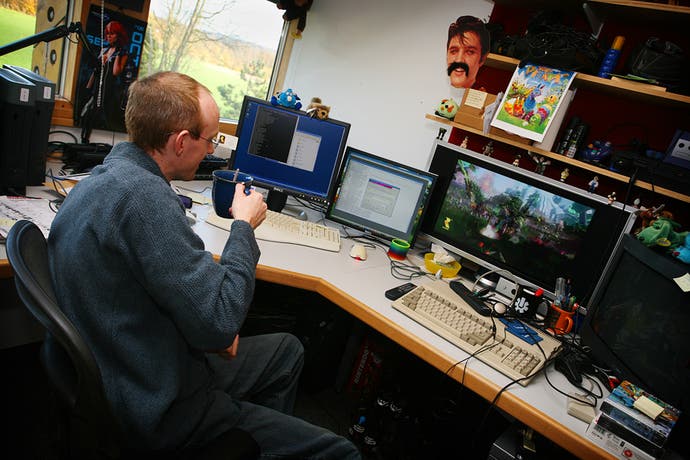
But in general? "We just kind of trusted our own instinct on what was fun. I think quite a lot of the team get bored quite quickly anyway, so if it kept us entertained for long enough then we thought it was, you know, okay for a kid who's had too much sugar." It's the first part of that sentence that's perhaps key: it's about what they felt was entertaining. "We worked on the game for four years, with however many people on this team at any one time," says Cook (around 50, we heard - a third fresh-faced, and the rest migrating from projects like Kameo), "and they've got to be enjoying what they're doing, or you're never going to get the game you wanted at the end. People are surprised by the depth, but really we had to keep ourselves amused as much as anybody else, and making it for children was just a matter of making it simple for them to play rather than..." He pauses. "Everyone likes the simple controls, a game that's easy to play. I don't think they're exclusive [to kids] - it's just almost out of fashion at the moment."
Although in some respects it's not. Indeed, Viva Pinata actually has something in common with Gears in this regard - both games have won plaudits for their accessibility. Gregg Mayles argues that it has a lot of the same audience in common too, and perhaps the accessibility factor is a key to that. "You look on the forums and it's quite amusing," he notes. "There are people saying, 'I waited until the shop was just about shut and snuck in and bought it' and 'I took it out and played it when there was no one to see me'. All these kind of hardcore Halo players, buying what is perceived to be a kids' game."

Or perhaps the key thing, as Cook puts it, is that "you take as much from the game as you want to take". "That's why it works for the kids as well - my kids are only five, and they sit and play the game and they don't get very far but they're actually just having fun messing around with the six worms and two sparrows and a mouse. And they're perfectly happy giving them all names and then clicking them on each other and telling stories and stuff. But then if you know about games, you can start finding more and more stuff about it. We just tried to put as much there as you could to discover - that was the other thing as well, we wanted to get back to games where you didn't know everything about the game before you even put the disc in the drive."
Something that people who do know games have also praised is the superb balance - the recurrent hook of having something going on in one area that feeds into another, which feeds into another, and another, until three hours have disappeared and you've written off most of the evening. A lot of that's down to the strength of the tools produced for the development team, says Cook. "Virtually everything you can see in the game was designed to be tweaked and adjusted," he explains. "And it was very, very much designed so idiots who have no computer knowledge could change things as much as they needed to to make it play. So they set us up with a great set of tools, and then we rued the day that we'd asked for so many tools because we spent hours trawling through sheets of numbers and adding one and taking five off... but I think that was the secret to that."




